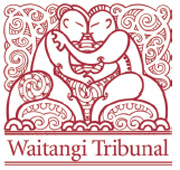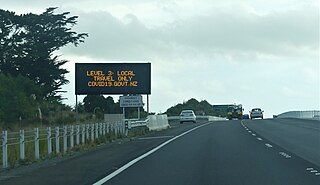
The Waitangi Tribunal is a New Zealand permanent commission of inquiry established under the Treaty of Waitangi Act 1975. It is charged with investigating and making recommendations on claims brought by Māori relating to actions or omissions of the Crown, in the period largely since 1840, that breach the promises made in the Treaty of Waitangi. The Tribunal is not a court of law; therefore, the Tribunal's recommendations and findings are not binding on the Crown. They are sometimes not acted on, for instance in the foreshore and seabed dispute.
The Therapeutic Goods Administration (TGA) is the medicine and therapeutic regulatory agency of the Australian Government. As part of the Department of Health and Aged Care, the TGA regulates the safety, quality, efficacy and advertising in Australia of therapeutic goods. Therapeutic goods include goods that are represented to have a therapeutic effect, are included in a class of goods the sole or principal use of which is a therapeutic use, or are otherwise determined to be a therapeutic good through a legislative instrument under the Therapeutic Goods Act 1989. Goods that are therapeutic goods must be entered on the Australian Register of Therapeutic Goods (ARTG), or otherwise be the subject of an exemption, approval or authority by the TGA under the Therapeutic Goods Act 1989, Therapeutic Goods Regulations 1990 or Therapeutic Goods Regulations 2002 before they can be imported, supplied, exported or manufactured in Australia.
A vaccination policy is a health policy adopted in order to prevent the spread of infectious disease. These policies are generally put into place by state or local governments, but may also be set by private facilities, such as workplaces or schools. Many policies have been developed and implemented since vaccines were first made widely available.

David Breen Seymour is a New Zealand politician who has been the Leader of ACT New Zealand and the Member of Parliament (MP) for Epsom since 2014. He currently serves as the 1st Minister for Regulation in the Sixth National Government under Christopher Luxon.
The COVID-19 pandemic in New Zealand was part of the pandemic of coronavirus disease 2019 caused by severe acute respiratory syndrome coronavirus 2. The first case of the disease in New Zealand was reported on 28 February 2020. The country recorded over 2,274,370 cases. Over 3,000 people died as a result of the pandemic, with cases recorded in all twenty district health board (DHB) areas. The pandemic first peaked in early April 2020, with 89 new cases recorded per day and 929 active cases. Cases peaked again in October 2021 with 134 new cases reported on 22 October.
There were several COVID-19 protests in New Zealand held during the period of COVID-19 restrictions from 2020 to 2022, where people protested the government's response to the COVID-19 pandemic in New Zealand, in particular the lockdown measures in place in March–May 2020, August 2020, and August–November 2021 and the later vaccine mandates. The protests have been largely condemned by members of parliament, as well as local city and regional councils. Fears were also raised about the protests increasing the spread of the virus.

The COVID-19 Public Health Response Act 2020 is a standalone legislation passed by the New Zealand Parliament on 13 May 2020 to provide a legal framework for dealing with the COVID-19 pandemic in New Zealand over the next two years or until the COVID-19 pandemic is brought under control. The Act allows the Minister of Health to make orders under Section 11 to give effect to the public health response to the COVID-19 in New Zealand. In late 2024, the COVID-19 Public Health Response Act 2020 was repealed by Parliament.

The New Zealand Government responded to the COVID-19 pandemic in New Zealand in various ways. In early February 2020, the Government imposed travel restrictions on China in response to the global COVID-19 pandemic originating in Wuhan and also repatriated citizens and residents from Wuhan. Following the country's first case, which originated in Iran, the Government imposed travel restrictions on Iran.

COVID-19 vaccination in New Zealand began on 20 February 2021, and will continue throughout the pandemic with the goal of vaccinating all willing New Zealanders aged 5 or older. Those aged 5 to 11 require a parent, caregiver or legal guardian accompany them to their appointment and provide consent for them to be vaccinated. As of 1 September, anyone in New Zealand, regardless of their immigration status, is eligible to be vaccinated.

A COVID-19 vaccine card is a record often given to those who have received a COVID-19 vaccine showing information such as the date(s) one has received the shot(s) and the brand of vaccine one has received, sometimes including the lot number. The card also contains information identifying the recipient and the location where the shot was given. Depending on the country, it could serve as an official document verifying one has received vaccination, which could be required by some institutions, such as a school or workplace, when boarding a cruise ship, or when crossing an international border, as proof that one has been vaccinated.

COVID-19 vaccine hesitancy in the United States is the sociocultural phenomenon of individuals refusing or displaying hesitance towards receiving the COVID-19 vaccine. COVID-19 vaccine hesitancy in the United States can be considered as part of the broader history of vaccine hesitancy.

This article documents the chronology of the response to the COVID-19 pandemic in October 2021, which originated in Wuhan, China in December 2019. Some developments may become known or fully understood only in retrospect. Reporting on this pandemic began in December 2019.

This article documents the chronology of the response to the COVID-19 pandemic in November 2021, which originated in Wuhan, China in December 2019. Some developments may become known or fully understood only in retrospect. Reporting on this pandemic began in December 2019.

This article documents the chronology of the response to the COVID-19 pandemic in December 2021, which originated in Wuhan, China in December 2019. Some developments may become known or fully understood only in retrospect. Reporting on this pandemic began in December 2019.

Over the course of the COVID-19 pandemic, COVID-19 vaccine mandates have been enacted by numerous states and municipalities in the United States, and also by private entities. In September 2021, President Joe Biden announced that the federal government would take steps to mandate COVID-19 vaccination for certain entities under the authority of the federal government or federal agencies. Most federal mandates thus imposed were either overturned through litigation, or withdrawn by the administration, although a mandate on health care workers in institutions receiving Medicare and Medicaid funds was upheld. All federal mandates were lifted when the national emergency was declared to have ended in May 2023. A small number of states have gone in the opposite direction, through executive orders or legislation designed to limit vaccination mandates.

A vaccine passport or proof of vaccination is an immunity passport employed as a credential in countries and jurisdictions as part of efforts to control the COVID-19 pandemic via vaccination. A vaccine passport is typically issued by a government or health authority, and usually consists of a digital or printed record. Some credentials may include a scannable QR code, which can also be provisioned via mobile app. It may or may not use a COVID-19 vaccine card as a basis of authentication.
The Biden administration COVID-19 action plan, also called the Path out of the Pandemic, is a substantial increase in the use of vaccination mandates as part of the U.S. federal government response to the COVID-19 pandemic announced by President Joe Biden on September 9, 2021, to be carried out by officials in the Biden administration. The plan included various announced prospective efforts, as well as the issuance of several executive orders.
The COVID-19 Protection Framework was a system used by the New Zealand Government during the COVID-19 pandemic in New Zealand. The three-tier traffic light system used vaccination and community transmission rates to determine the level of restrictions needed. It came into effect at 11:59 pm on 2 December 2021, replacing the four-tier alert level system, which used lockdowns. On 12 September 2022, Prime Minister Jacinda Ardern announced that the traffic light system would be dropped at 11:59 pm that night.
My Vaccine Pass was a vaccine certificate issued by the New Zealand Government that served as an official record of one's COVID-19 vaccination status during the COVID-19 pandemic. The vaccine pass was required to enter hospitality venues, community, sport and faith-based gatherings, as a result of the COVID-19 Protection Framework having come into effect on 3 December 2021. The passes expired on 1 June 2022.
COVID-19 vaccination mandates in Canada are the responsibility of provinces, territories, and municipalities, and in the case of federal public services and federally-regulated transportation industries, the federal government. COVID-19 vaccines are taxpayer funded in Canada and made available free of charge through the public health care system. The federal government is responsible for procurement and distribution of the vaccines to provincial and territorial authorities; provincial and territorial governments are responsible for administering vaccinations to people in their respective jurisdictions. Mass vaccination efforts began across Canada on December 14, 2020. As the second vaccinations became more widely available in June 2021, Manitoba became the first province in Canada to offer a voluntary vaccine passport.









